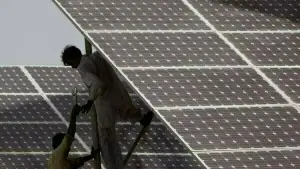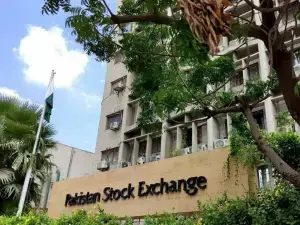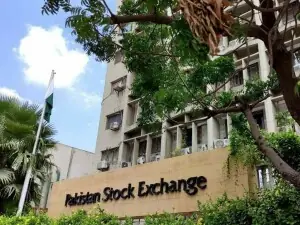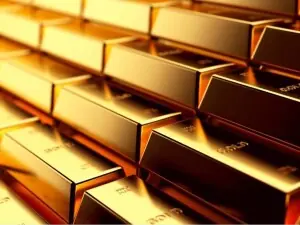Sixty-eight years into our existence as an independent country we are beset with numerous crisis. The latest is the warning by IRSA that the nation is on the verge of a mammoth water crisis, which would put the energy crisis look like a picnic. It has recommended putting a freeze on PSDP for five years and diverting all resources towards building of water reservoirs. Irsa's bolt out of the blue has not shaken our decision makers out of the deep slumber they are in. Pity the poor Minister of Water and Power who was made to twiddle sitting on the power powder keg and now he will be the fall guy for the explosive water fiasco. In fact the government is oblivious to the multifaceted crisis starring us in the face and is continuing with its misguided priorities, nepotistic management and favourite wasteful projects which aren't going to pull us out of our mess.
Thanks to the armed forces, we are finally waging a war against religious extremism and terrorism which had spread like a cancer in our nation. Our commercial capital Karachi is dying because of the unholy alliance of organised crime, politics and extremism. The nation as a whole is slowly but surely sinking in the quagmire of illiteracy, malnutrition, disease and poverty. Underlying all these crises is the mother of all crises that is the crisis of governance and leadership. We are in the list of top ten failed states of the world along with luminaries like Somalia, South Sudan and Afghanistan.
We are the sixth largest population in the world but our GDP is ranked at 138.. Our ranking in the human development index is 146, and in the global competitiveness index we are ranked 133 even lower than Nepal. The World Bank ease of doing business ranks us at 122 while the economic freedom index grades us "economically as mostly unfree" at a rating of 121. Our children rank at the bottom in learning science and mathematics. These International benchmarks are a reflection of our failed and dysfunctional economic and political system and unless we take comprehensive action of reform and change we can be, God forbid, consigned to the dustbin of history. We love to be called resilient but we are quite lethargic as a people to push for change and our dispossessed seem to have infinite patience with the status quo. This is perhaps why our leadership can get away with such dismal performance over such a prolonged period of time.
Amidst our immediate crisis we are also facing at least four mega trends that we can benefit from provided we can change our future actions.
These trends are:
1. Globalization international trade and ascendancy of the market economy
2. Shift from a world dominated by the Atlantic Ocean economies to a world dominated by the Indian and Pacific Ocean economies.
3. Demographics and the youth bulge of Pakistan.
4. Urbanisation and Shift in Pakistan from an agrarian rural economy to an urban industrial and service economy.
These trends both global and domestic are interconnected and how we mange them will determine the future of the people of Pakistan. Right from the start at independence the geopolitical opportunities were immense as illustrated by a top secret memorandum of the British Chiefs of Staff dated July 1947 that said," The area of (west) Pakistan is strategically the most important in the continent of India and the majority of our (British) strategic requirements could be met by an agreement with Pakistan alone." In a related British memorandum dated May 1948 it was stated that," The Indus valley, Western Punjab and Balochistan are vital to any strategic plans for the defense of the all important Muslim belt ... the oil supplies of the middle east." It also stated that Pakistan is the keystone of the strategic arch of the wide and vulnerable waters of the Indian Ocean."
Sixty-eight years later, the statement still rings true as can be witnessed by the intense competition and rivalry going on in the Indian Ocean and the rise of ISIS in the Middle East. Pakistan's ability to project and win influence and economic benefits from its geo-strategic position depends critically on its internal economic strength, which in the past has proved to be the fly in the ointment. Until 1965 we were on track to fulfil our destiny of being the lynchpin of the region. We built the dams so that the rural agrarian economy could generate the capital surpluses for the industrial urban economy. The dams rejuvenated the water-starved farms and provided the cheap power for industries while mechanization of agriculture meant that the rural labour surplus was available for absorption in the urban industrial economy. We were well on the way to becoming the first Korea of the region when foolishly we stumbled into the 1965 war and got derailed. The rest is history. We lost our eastern wing in 1971 and due to nationalisation we lost our free market economy along with our alliances and potential markets. The dam building came to a screeching halt at the hands of General Ziaul Haq and remains so thanks to the PPP and the ANP politicisation of the dams.
The rural capital surpluses vanished but the manpower continued to be shed as the rural economy could not sustain such a large population of youth. Shanty towns mushroomed in our cities and we became dependant on borrowing and debt. The rural economy needed land, labour, water and technology to flourish. We had all the ingredients but we didn't manage it right. Consider for example that with 1 million acre feet (maf) of water California adds $3 billion of agriculture output. Our rivers have flows of around 150maf of water a year and in addition we tap another 50maf of ground water for a total of 200maf of fresh water every year. This could potentially yield $600 billion of agriculture output a year that is 12 times greater than Pakistan's current agriculture GDP. Consider also the hydro power potential of Pakistani rivers. The potential is 100,000MW of clean green power. The value of this power even at today's depressed oil prices would be around $40 billion a year. Water was and is the competitive advantage of Pakistan. Our leaders played politics with it and destroyed it.
They knew that water is key to development - whether it is irrigation, drinking water, food security, nutrition security, poverty reduction, economic growth, energy production, industrial development, human health - water is the nexus. Water is a key factor in the achievement of each of the Millennium Development Goals for our people. Without water security, there will be no food security, energy security will be compromised and poverty reduction and economic growth will not be sustainable. Yet they deliberately deprived the nation of this bounty of nature and deliberately kept the people poor. They knew that 25 million acres of arable land can be bought under farming by building the Kalabagh Dam primarily in eastern Sindh, southern Punjab, southern KPK and eastern Balochistan. These are the poorest areas of Pakistan and afflicted with malnutrition, poverty, hunger and disease yet our politicians didn't care and became insurmountable obstacle in developing the Dam. Blood of the poor children of Thar is on their grubby hands.
Our criminal neglect of not fully exploiting our water resources and not extracting maximum benefit from every drop of water has been very costly. If over the last forty years we had developed this potential our economy today would not be a paltry $250 billion but would have crossed the trillion dollar mark and we would have been a member of the G20 instead of being a basket case of Asia. We would have been independent of international donors and charity organisations. We would have wiped out poverty and our per capita income instead of being around $1200 would have been a respectable $5000 with a huge middle class. We would have generated enormous resources for underpinning our security, investing in our people and would have generated enough capital surpluses for our urban areas to build ten Dubais right here in Pakistan. The shift from rural agrarian economy to an urban industrial economy would have yielded huge and sustainable dividends. The water politics and management has been indeed a treacherous ploy for depriving the people of Pakistan. It not only deprived us from reaping the demographic dividend but also took the wind out of our rural urban transformation.
Now consider the globalization phenomenon and the shift of global economy towards Asia, a process which held great potential for us as the British rightly identified 70 years ago. As a large country and a pivot state in western Indian ocean we have not positioned us for benefiting from this global movement. Our great friend China when it decided to open up its economy and viewed the world as its market first focused on its coastal region. The special economic zones were all established on the coast where the free market economy took off. Great manufacturing and trading cities emerged where once cabbage fields were the only reflection of economic activity. It was only after the coast had taken off that the rest of the country was opened up to participate in globalization.
In contrast in Pakistan we have lost control of our coastline. Karachi has been hostage to all forms of mafias and terrorists, while Gwadar has not been connected to the hinterland. In fact all of our coast from Keti Bandar to Jiwani is economically disjointed from the hinterland. We have neither developed it nor provided the security needed for investment to flourish on the coast. Let's remember that 90 percent of world trade is sea-borne while the majority of global population lives and works within 200 miles off the coast. Ports and transshipment points, export industries and export processing zones, merchant shipping, ship building, marine fisheries are all concentrated in the coastal regions. Ten of the world's largest shipyards are in Asia and most of the world's most prosperous mega cities are on the coast.
We are still one of the most strategically placed country in the most important part of the world. We have the sixth largest and perhaps the youngest population in the world. Location wise there are many opportunities. To the north-west, post-war Afghanistan can be a big boost for us. Second, the entire resource-rich Central Asia region is coming out of its teething problems and looking for trade, oil and gas exports and logistic connections, beyond it a reasserting friendly Russia can be a big plus. Third, in the west, Iran and Arab competition needs to be managed as a source for economic and social development. Fourth, the Arab awakening needs a peaceful transition to a democratic and prosperous future. Fifth, the vast Indian Ocean rim from the African Coast, the Persian gulf, the Arabian sea to the straits of Malacca can be an area for explosive rivalries as well as economic growth and trade in which Pakistan has a key role to play. Sixth, the neighbouring great Chinese economy is quickly becoming the second largest economy in the world with huge possibilities for us. Seventh, our colossal neighbour to the east has a dynamic economy but has yet to give us economic or political space. When it realises the need to engage us meaningfully the dividends can be enormous.
Thus, exploiting Pakistan's geography and demography would be a big advantage for us and inter alia must form the cornerstone of our future alliances, market-based economic vision and governance strategies. One thing is apparent that whenever we had functioning global alliances, ascendancy of the markets and better governance, the economy functioned better than otherwise. It is also clear that Korea through its alliances, markets and governance took its economy from US $8 billion in 1970 to over US $1500 billion in 2014 whereas over the same time period we took our US $10 billion economy in 1970 to a miniscule US $250 billion in 2014. Going forward, the questions facing us are: Can we recapture the Quaid's vision? Can we build a globally-integrated vibrant market economy that doubles every ten years? Can we wipe out poverty in our life time? Can we get the governance which we deserve? The answer to all these questions is a cautious yes provided we put a comprehensive game plan in place to achieve all this and much more. As a start, along with operation Zarb-e-Azb it is clear that we need to also launch an operation Zarb-e-Azb to demolish all hurdles in utilising our water potential, which underpins fully achieving our future economic potential.
BR100
16,307
Increased By
236.2 (1.47%)
BR30
51,537
Increased By
1163.4 (2.31%)
KSE100
157,953
Increased By
1775.7 (1.14%)
KSE30
48,199
Increased By
520.5 (1.09%)






















Comments
Comments are closed.